Abstract
Repeated drug consumption may progress to problematic use by triggering neuroplastic adaptations that attenuate sensitivity to natural rewards while increasing reactivity to craving and drug cues. Converging evidence suggests a single sub-anesthetic dose of the N-methyl-D-aspartate receptor antagonist ketamine may work to correct these neuroadaptations and restore motivation for non-drug rewards. Using an established laboratory model aimed at evaluating behavioral shifts in the salience of cocaine now vs money later, we found that ketamine, as compared to the control, significantly decreased cocaine self-administration by 67% relative to baseline at greater than 24 h post-infusion, the most robust reduction observed to date in human cocaine users and the first to involve mechanisms other than stimulant or dopamine agonist effects. These findings signal new directions in medication development for substance use disorders.
Dakwar, E., Hart, C. L., Levin, F. R., Nunes, E. V., & Foltin, R. W. (2016). Cocaine self-administration disrupted by the N-methyl-D-aspartate receptor antagonist ketamine: a randomized, crossover trial. Molecular Psychiatry. http://dx.doi.org/10.1038/mp.2016.39
Link to full text













